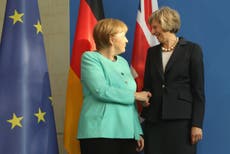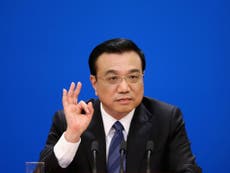Theresa May’s honeymoon will soon be over and then she’ll be in trouble
The new Prime Minister is in the weakest position of anyone assuming office since James Callaghan


Theresa May and Jeremy Corbyn: the resistible force and the movable object. The new Prime Minister is in the weakest position of anyone assuming office since James Callaghan, and she faces a leader of the opposition absolutely determined to avoid wresting power from her. Who is going to win this contest of losers?
May is better placed to start off with, obviously. She is just starting the kind of honeymoon that even Gordon Brown was granted by the fair-minded British people. But consider what she faces. She is entrusted with getting Britain out of the European Union, which means she has to choose between shutting down free movement of workers from the EU and our access to the single market.
Despite being a Remainer, her instinct is aligned with the 52 per cent who voted to Leave, in that her preference is to reduce immigration rather than to defend free trade. I am surprised by how little attention has been paid to her speech to the Conservative Party conference last year in which she said: “The numbers coming from Europe are unsustainable.”
Yet she is working through a Parliament and a civil service that is aligned with the 48 per cent who voted to Remain.
Just look at the arithmetic of the House of Commons. She has a working majority of 16. On any question to do with Brexit, she can rely on the support of Labour’s 10 anti-EU MPs, plus the eight Democratic Unionists and Douglas Carswell, the Ukip MP. So she needs to lose only 28 Tory MPs and her majority is gone.
Remember that she sacked 23 ministers in her first few days. Remember, too, that most of her MPs are Remainers. Although, some of them, like her, may have gone over to the other side. Most of the rest say the verdict of the British people must be respected. But when difficult votes come to the floor of the House, they may interpret the will of the people in their direction.
Over the next two or three years of Brexit negotiations, the Remain majority in the Commons could act like a ratchet, each time preferring fewer restrictions on EU immigration and more single market.
If the Labour Party had a forceful leader, it could make May’s life hard. Personally, I am uncomfortable with talk of a second referendum: it seems wrong to seek to reverse a referendum decision so soon. And it is positively dangerous to say that a decision should be disrespected because the other side lied. I agree with Robert Tombs, the historian who voted Leave, disagreeing with Professor Gabriel Josipovici in The Times Literary Supplement this week: “He accuses many Leave voters of not understanding what they were voting for. I think precisely the same of many Remain voters.”
But I can see that the demand for a second referendum is effective politics. Owen Smith made it an early part of his campaign for the Labour leadership, which is one reason I think he might do better against Corbyn than some people think. If Smith made his campaign a full-throated attempt to reverse the referendum he could embarrass Corbyn with Labour members, who are 90 per cent pro-EU.
It wouldn’t take much to expose Corbyn’s deep Euroscepticism. Lilian Greenwood, the former shadow transport secretary, revealed this week how Corbyn had sabotaged weeks of work to agree a position on how Labour could renationalise the railways under EU law: “Jeremy went on Sky News and took a completely different, Eurosceptic line.”
I am told that Corbyn’s own staff says that he never wanted to remain in the EU and refused to campaign “properly” on it in the referendum.
Even so, I suspect that Smith won’t win. Thousands of people have signed up as registered supporters to vote against Corbyn, but many thousands more have probably signed up to vote for him.
May needn’t worry about the opposition for a while yet. The enemies that matter are on her own side. Boris Johnson, the Foreign Secretary, was talking unhelpfully in New York on Friday about how we can keep the EU financial passport (that is, free trade with the EU in financial services) outside the EU.
And in two or three years’ time, when the UK – if Scotland is still part of it, that is – actually comes to leave, how is she going to get the legislation through Parliament? Not just the Remain-majority Commons but the even more Remainy Lords? There may not need to be a second referendum, but there will certainly have to be an election. If the economy is in trouble and if Corbyn has gone by then, who can say what will happen?







Join our commenting forum
Join thought-provoking conversations, follow other Independent readers and see their replies